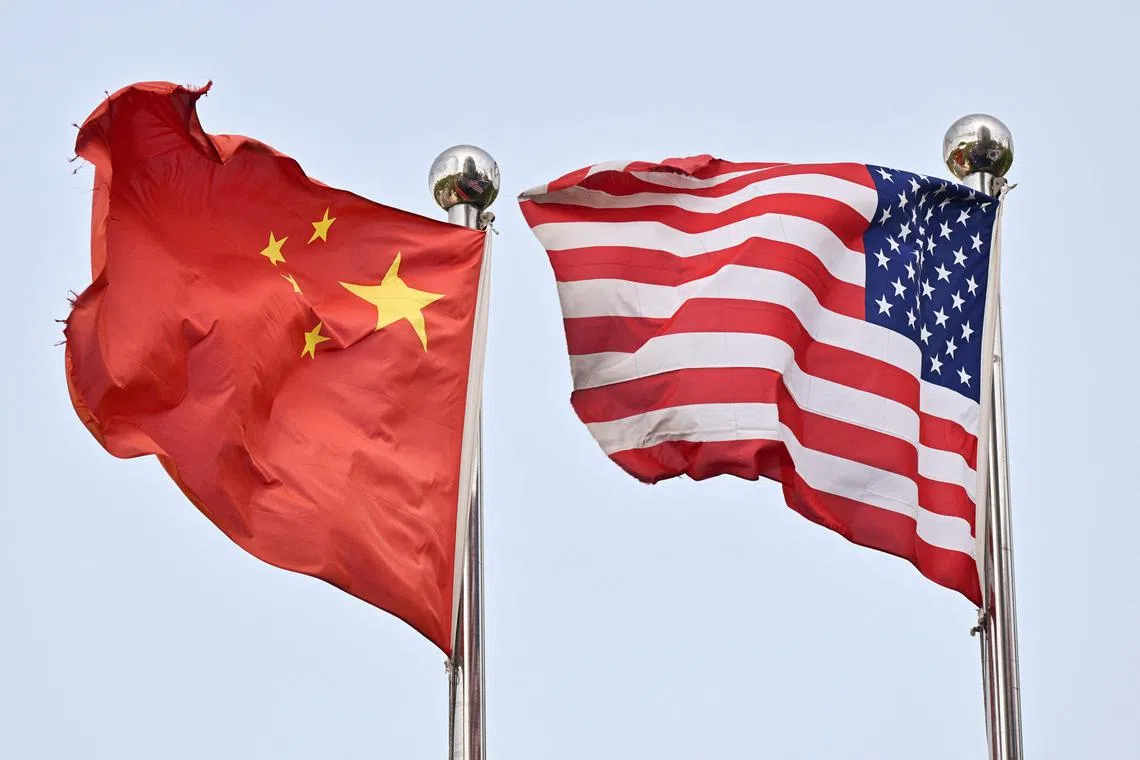US Democrats, Republicans plan Bills to pressure China as Trump pushes trade
Sign up now: Get ST's newsletters delivered to your inbox

Facing Mr Trump's Aug 12 deadline, top US and Chinese economic officials will meet in Stockholm on July 28 to try to tackle their longstanding disputes.
PHOTO: AFP
Follow topic:
WASHINGTON – US senators from both major parties plan to introduce Bills this week targeting China over its treatment of minority groups, dissidents and Taiwan, emphasising security and human rights as President Donald Trump focuses on trade with Beijing.
The three Bills, seen by Reuters ahead of their introduction, have Democratic and Republican sponsors, a departure from the fierce partisanship dividing Washington.
Mr Trump’s push to reach economic agreements between the world’s two biggest economies has strong support in Congress, especially from his fellow Republicans, but has prompted some China hawks to worry that the US government is de-emphasising security issues.
“It does appear that President Trump is keen to negotiate some kind of deal with China, and gaps are opening between his approach to China and the approaches of some members of his team, as well as with Congress, which overall has been quite hawkish on China,” said Ms Bonnie Glaser, an Asia expert at the German Marshall Fund of the United States think-tank.
The desire for a hardline on China is one of the few truly bipartisan sentiments in the perennially divided Congress, even as many lawmakers support Mr Trump's efforts to rebalance the bilateral trade relationship.
“The United States cannot afford to be weak in the face of the People’s Republic of China and its aggression around the world,” said Democrat Jeff Merkley of Oregon, a lead sponsor of all three Bills.
“No matter who is in the White House, America’s values of freedom and human rights must remain at the heart of a clear and principled vision that guides our leadership on the global stage,” Mr Merkley said in a statement.
White House officials have said that Mr Trump remains fully committed to Asia-Pacific security issues, as he pursues his trade agenda and a good personal relationship with Chinese President Xi Jinping.
Asked for comment on July 28, White House Deputy Press Secretary Anna Kelly said administration officials do not get ahead of the president on pending legislation.
“President Trump has publicly discussed his desire for a constructive relationship with China. He is focused on advancing American interests, such as leveling the playing field for American industries and getting China to stop the flow of fentanyl into our country,” she said via email.
Trade versus security
One Bill, co-sponsored by Republican John Cornyn of Texas, would deny entry into the US of current or former Chinese government officials who were deemed to have engaged in the forced repatriation of members of China’s Uighur minority.
Human rights groups accuse China of widespread abuses of Uighurs, a mainly Muslim ethnic minority numbering about 10 million, in its north-western region of Xinjiang. Beijing denies any abuses.
Another, co-sponsored by Republican John Curtis of Utah, aims to help Taiwan, as the island faces increasing pressure from China.
It would support countries in Latin America and the Caribbean that maintain official diplomatic relations with Taiwan and would take other steps to deepen coordination with Taipei.
China claims the democratically governed island as its own and has never renounced the use of force to bring Taiwan under its control. Beijing has stepped up military and political pressure on the island in recent years.
A third Bill, co-sponsored by Republican Dan Sullivan of Alaska, seeks to combat “transnational repression” – efforts by any foreign government to reach beyond its own borders to intimidate, harass or harm dissidents, journalists or activists.
Facing Mr Trump’s Aug 12 deadline, top US and Chinese economic officials will meet in Stockholm
Mr Trump “cares about opening foreign markets to American trade, and that’s what he’s always cared about. And that is going to run counter to a lot of national security imperatives”, said Mr Michael Sobolik, who specialises in US-China relations at the Hudson Institute think-tank.
Democrats and some of Mr Trump's fellow Republicans raised concerns about the announcement in July that Nvidia will resume sales of its H20 artificial intelligence (AI) chips to China
This reversed an AI restriction imposed in April that was designed to keep the most advanced AI chips out of Chinese hands. REUTERS

